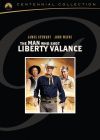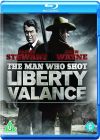The Man Who Shot Liberty Valance (1962)
Aging though Wayne may have been, it did not deter John Ford from calling on him to play a part far younger than his years in The Man Who Shot Liberty Valance. It is rather disconcerting at first sight to find not only Wayne but James Stewart playing young roles (though Stewart also appears as an old man). Ford must have been more comfortable working with two actors he knew so well rather than less experienced players he would have had to whip into shape, but Wayne and Stewart are also cast to take advantage of what they stand for. Stewart, as Ranse Stoddard, is the tenderfoot lawyer out West and he quite naturally embodies qualities of fundamental decency and altruism and the same respect for the law as he did, for example, in Mr. Smith Goes to Washington (1939). As Tom Doniphon, Wayne just as ideally symbolizes dogged individualism, playing the simple, old-fashioned kind of Westerner who can pat his gun and say "Out here a man settles his own problems," and who replaces community spirit with personal loyalities and friendships. Another difficulty at first sight is the stark sets, which give an air of unusual realism yet clash with the gargantuan meals served by the film's restaurant that belong to the West of fictional elaboration. But the clash between the West of fact and the West of legend is central to the film. On repeated viewings, it shapes up as one of Ford's most heartfelt and moving pictures. No other film has so poignantly confronted the real West of slow and difficult progess with the colourful West of legend. No other film has so hauntingly conveyed the transition between the old and new West in making Wayne's Tom Doniphon both the instrument and victim of its evolution.
The framing story shows Ranse Stoddard, a celebrated politician, returning with his wife Hallie to the small town of Shinbone to attend the funeral of Tom Doniphon who has died in complete obscurity. The town's newspaper presses him to give the reason for his interest in this apparent nonentity and, with a consenting smile from Hallie, he cues the flashback that forms the bulk of the film.
We see Ranse on his way out West as a young man hoping to set up as a lawyer and being involved in a stage hold-up and brutally beaten by the leader of the robbers, Liberty Valance (Lee Marvin), when he tries to protect a lady (Anna Lee). He is found by Wayne and his hired hand Pompey (Woody Strode) and brought into town to be nursed by Wayne's girlfriend Hallie (Vera Miles) and the Swedish couple (John Qualen, Jeanette Nolan) who run a restaurant. Wayne is amused at Ranse's determination to bring Valance to justice, knowing that the tubby town marshal (Andy Devine) is scared stiff of the notorious badman. "Liberty Valance is the toughest man south of the picket wire - next to me," Wayne declares, and advises Ranse to pack a gun. But Ranse rejects this crude counsel and his quiet determination appeals to Hallie as does his enthusiasm for teaching her to read and write. While Ranse looks to the future, Wayne clings to the present. All he can offer Hallie is oldfashioned gallantry, bringing her cactus roses, saying twice she looks awful pretty when she's mad, and prolonging their courtship indefinitely. He even hauls Pompey out of one of Ranse's classes, showing how his mind is shut to the future.
Ranse is goodnaturedly helping out as a waiter in the restaurant when Liberty Valance tries to provoke him by tripping him up. Wayne intervenes to order Valance to retrieve the steak that has fallen on the floor but Ranse steps in to do it instead and stop the two men shooting it out. However, Ranse secretly starts to accept Wayne's belief in force to meet force and practices firing a revolver. The worried Hallie asks Wayne to help him. Concerned over Hallie's fears for Ranse, Wayne makes a point of telling him that Hallie is his girl, gives him a rather sharp lesson in shooting and makes a fool out of him, puncturing paint tins as Ranse is putting them up as targets. Ranse angrily knocks Wayne to the ground, giving the actor an opportunity to put on one of those cross-eyed expressions of muddled amazement.
Ranse starts to organize the people to use their voting strength to defeat the territory's big cattle interests who are resisting Statehood to protect their own power and keep open range. Ranse proposes Wayne as a delegate to a territorial convention but Wayne refuses, planning to concentrate on his personal plans which include finally marrying Hallie. He seconds a proposal that Ranse should be the town's delegate along with the local newspaper editor (Edmond O'Brien). A third, self-nominated candidate is Liberty Valance, who is in the employ of the big ranchers. He is roundly rejected and promises to kill Ranse. Wayne urges Ranse to slip out of town but Ranse's resolve to stay is strengthened when Valance nearly murders the newspaper editor. Hallie calls on Wayne to protect Ranse from Valance. Liberty and Ranse confront each other on the street. The gunman fires three shots around Ranse to tease him. When Ranse returns a single shot, Valance falls dead. Hallie is so overwhelmed to see Ranse safe and so proud of his courage that she transfers her affections to him. A surly Wayne turns up to apologize for arriving too late, then walks away. He starts drinking heavily in a local saloon and turns angrily on two of Valance's men (Lee Van Cleef, Strother Martin) who are hopefully trying to stir up a lynch mob to avenge their leader's death. Pompey collects him and takes him back to his ranch where he expresses his deep hurt at losing Hallie by setting fire to the extension to his ranch that he was building for Hallie's benefit.
Now that Liberty has been killed, the way is clear for Ranse to further his campaign but he wilts under the accusation of being a killer. He walks out of the territorial convention to be stopped by Wayne who explains that Ranse didn't kill Liberty Valance; he did. He had arrived on the scene as Ranse was facing Liberty and had fired his rifle from the shadows to coincide with Ranse's shot. With his conscience cleared, Ranse is able to return to the convention and lead the territory to Statehood, Hallie by his side. As Ranse rises to the heights in politics, Wayne is left behind, an understandably bitter loser whose time is past. We don't see (or need to see) what becomes of him: his obscurity at the time of his death tells us enough.
The part of Tom Doniphon shows both the virtues and limitations of the Wayne image. Wayne has done all the right things. Though a rancher, he has aligned himself with the townspeople. He has proved his point about needing to deal with Liberty Valance on his own terms with a shootout. He has taken on the job himself and only revealed his part in Liberty's death when it was necessary. But he has had a reluctant role in shaping progress. He is too stubborn and self-centred to change his ways. He believes in the individual, in the "liberty" expressed in Valance's first name as long as it doesn't harm others, and he responds to Hallie's demands on him, to Valance's acts of provocation, rather than to general issues. He can assert Pompey's right, as a colored man, to drink in a saloon because drinking is part of a way of life he believes in and Pompey is his friend, yet deny Pompey the chance to educate himself and disturb the relationship between them. Like Ethan Edwards in The Searchers (1956), he has to live with himself and it is a lonely business for such unadaptable types.
At the end of the film, the Western wilderness has become a cultivated garden as Hallie had foreseen. She places a cactus rose, symbol of an unirrigated past, on Wayne's coffin. The shadows of history have claimed him - the newsman refuses to disturb the legend of Valance's death - as at various points in the film Wayne has stood in the dark outside the mainstream of
events. He had shot Valance from a dark passageway while the spotlight was on the gunman and Ranse Stoddard in the brightly illuminated street. He had walked away from the lit door to leave Hallie with Ranse and disappear into the darkness of the night. He has walked away again as Ranse re-entered the convention hall to rousing cheers, stepping into the public eye as Wayne disappears from it. It is impossible not be moved by this figure: the hero drowned by the tide of history.
CAST
| Tom Doniphon | John Wayne |
| Ransom Stoddard | James Stewart |
| Hallie | Vera Miles |
| Liberty Valance | Lee Marvin |
| Dutton Peabody | Edmond O'Brien |
| Link Appleyard | Andy Devine |
| Pompey | Woody Strode |
| Nora Ericson | Jeanette Nolan |
| Peter Ericson | John Qualen |
| Reese | Lee Van Cleef |
| Floyd | Strother Martin |
| Doc Willoughby | Ken Murray |
| Amos Carruthers | Denver Pyle |
| Widow in stage holdup | Anna Lee |
| Major Cassius Starbuckle | John Carradine |
| Maxwell Scott | Carleton Young |
Shooting from September 5 to early November 1961.
Released April 22, 1962 (U.S.); May 28, 1962 (G.B.)

|

|
Buy the Movie Here Today!
Click on left image for DVD or right image for Blu-ray.
Your comments or suggestions are welcome and encouraged.
| Search this site | What's new | Site map |
